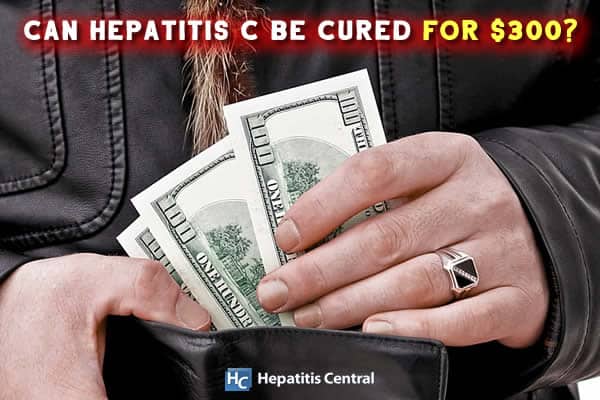Can Hepatitis C Be Cured for $300?


Hepatitis C (HCV) is treatable if caught early. Treatment for HCV typically costs $84,000 for a round of therapy using traditional medications marketed by pharmaceutical “for profit” companies. However, recently, a trial of two new medications promoted by the DNDI has given hope to a treatment regimen that would last a mere 12 weeks and cost $300.00 (1).
The World Health Organization (WHO) has set a goal of the elimination of HCV by 2030, a feat now possible with the introduction of these novel new treatments for HCV (2). This feat will require 80% or more of infected patients being diagnosed and receiving treatment.
How is HCV Usually Treated?
Hepatitis C is treated with medicine that keeps the virus from multiplying in the body and it usually takes several weeks for an effect to be noticed physiologically.
Until most recently, two main medications were available for costly treatment – pegylated interferon (an injection every week) and ribavirin (a capsule or tablet). These treatments were costly – sometimes running $1,000 per pill or injection.
Then, three other drugs came on the scene including simeprevir, sofosbuvir and daclatasvir. Using the latest medications, more than 90% of people with HCV can be cured (3). These last 3 medications belong to a class of drugs called direct antiviral agents (DAA).
Although effective drugs have been on the market for years, their high cost meant that only 3 million or fewer people were being treated because of the financial constraints.
New Acting Antivirals
Till recently, pegylated interferon was the costly standard of care therapy. However, it had suboptimal success rates and had many side effects (4).
Direct antiviral agents entered the market to offer safer, more effective, albeit expensive alternatives, such as simeprevir (discontinued in May 2018), ledipasvir, sofosbuvir and daclatasvir (discontinued in June 2019).
Then, ravidasvir, a novel DAA hit the scene. Phase 1 and 2 trials confirmed its safety and tolerability and its effectiveness at suppressing viral loads in short periods. It inhibits the replication of HCV variants that develop resistance mutations for different DAA classes of drugs (4).
Phase II/III Multicenter Trial of Sofosbuvir and Ravidasvir- STORM-C
A phase II/III multicenter trial of sofosbuvir and ravidasvir as combination therapy in HCV treatment was started in November 2016 against 4 genotypes of HCV in cirrhotic and non-cirrhotic patients. Stage 1 has been completed and Stage 2 completion results were presented showing 301 people as 97% cured after being treated with the combination pill of sofosbuvir and ravidasvir. Hard to treat cases such as those with cirrhosis also showed very high cure rates of 96% and 97% respectively (1, 5).
The Sofosbuvir Plus Ravidasvir for the Treatment of HCV Chronic Infection or the STORM-C trial is expected to end December 2023 with primary completion dates set for March 2021 (5).
Hepatitis C Medication Costs
Even with the US drug maker Gilead lowering its price of the Harvoni (ledipasvir and sofosbuvir) tablets and other medicines to treat HCV in lower- and middle-income countries, it is still too expensive for governments to initiate HCV screening and treatment programs. Harvoni costs about $48,000 for a 12-week course in Malaysia and $12,000 in Chile (1).
The STORM-C trial may usher in public health programs that may cost governments as little as $300 – $500 to complete a treatment trial for HCV using the combination therapy of sofosbuvir and ravidasvir.
Several studies have validated the cost effectiveness of screening for HCV although cost effectiveness is different from affordability (6). Currently, it is reasonable to assume that DAAs give the best value for the money. Countries and other interested stakeholders are recognizing the need to step up their screening programs for HCV intervention (7) regardless of affordability.
Cost Burden in Commercially Insured Individuals
While the cost burden for the insured in a US study remained low with the plan bearing the brunt of 99% of the HCV medications, the financial benefits to the health plan of the cure of HCV infection by new DAAs was not evident. This data extraction was done without consideration of the combination treatment of sofosbuvir and ravidasvir. Such projections are likely to change once this formulation hits the markets (8).
The published acquisition of sofosbuvir was $1,000 per day in 2014 with additional costs for add-on medications. This is quite different from the combination therapy of sofosbuvir and ravidasvir being $300 for the course of the treatment as outlined in the DNDI reports.
The non-profit research and development arm of DNDI recently announced the contribution of 2.2 million US dollars to the continuing research of this combination treatment therapy indicating a global interest in solving the HCV epidemic. This contribution by Pharmaniaga, the Malaysian pharmaceutical company, will support the registration of this new treatment combination of sofosbuvir and ravidasvir for people living with the hepatitis virus in Malaysia.
Future Testing
There are six genotypes to the HCV infection. Future testing will occur in Egypt who, so far, even with different genetic characteristics, exhibit a 100% cure rate. Four of six of the genetic types have shown responsiveness to the drug combination to date. Further studies are being carried out in South Africa and the Ukraine.
DNDI has licensed rights for ravidasvir in low- and middle-income countries from the Californian firm that originally developed it, Presidio Pharmaceuticals. This license will help DNDI bring affordable combination therapy to countries that need it, to put an end to treatment rationing and to battle the high cost of HCV therapy.
This combination therapy could be the answer to the high cost of treatment of HCV infected individuals as well as to encourage the implementation of more screening programs to catch the millions of people who do not know they are infected with HCV. It will also assist low income individuals who cannot afford treatment or whose insurance companies do not cover it or who live in countries where pharmaceutical incentives to patients do not exist.
It will not prevent the risk of re-infection. It is not a vaccine. It is a treatment and preventative measures to avoid reinfection must still be followed.
- Kollewe, J. (2018, April 13). Non-profit’s $300 hepatitis C cure as effective as $84,000 alternative. The Guardian. Retrieved 2/21/2020 from https://www.theguardian.com/science/2018/apr/12/non-profits-300-hepatitis-c-cure-as-effective-as-84000-alternative
- Efforts to register new hepatitis C treatment in Malaysia receive support from Pharmaniaga. (2019, Nov 25). Drugs for Neglected Diseases Initiative, Retrieved 2/20/2020 from https://www.dndi.org/2019/media-centre/press-releases/efforts-register-new-hepatitisc-treatment-malaysia-support-from-pharmaniaga/
- Hepatitis C. (n.d.) National Institute of Diabetes and Digestive and Kidney Diseases. Retrieved 2/20/2020 from https://www.niddk.nih.gov/health-information/liver-disease/viral-hepatitis/hepatitis-c
- Hafez E., Elbez, T., Kassas, M.E., and Esmat, G. (2018). A new potent NS5A inhibitor in the management of hepatitis C virus: Ravidasvir. Curr Drug Discov Technol, (15)1. Abstract retrieved from http://www.eurekaselect.com/154190/article
- Sofosbuvir plus ravidasvir for the treatment of HCV chronic infection (STORM-C). (2020, Feb.5). Clinical Trials.gov. Retrieved 2/20/2020 from https://clinicaltrials.gov/ct2/show/NCT02961426
- Overview of cost reimbursement, and cost effectiveness considerations for hepatitis C treatment regiments. (2019). Infectious Disease Society of America. Retrieved from https://www.hcvguidelines.org/evaluate/cost
- Khwairakpam, G, Burry, J. (2019). Strategies for access to affordable hepatitis C testing and treatment in Asia. Current Opinion in HIV and AIDS, 14(1):1. Retrieved from https://www.researchgate.net/publication/329134063_Strategies_for_access_to_affordable_hepatitis_C_testing_and_treatment_in_Asia
- Lu, C. Y., Degnan, D. R., Zhang, F., LeCates, R., Lupton, C., Sherman, M. and Wagner, A. (2019, December). Cost burden of hepatitis C virus treatment in commercially insured patients. The American Journal of Managed Care. Retrieved from https://www.ajmc.com/journals/issue/2019/2019-vol25-n12/cost-burden-of-hepatitis-c-virus-treatment-in-commercially-insured-patients







